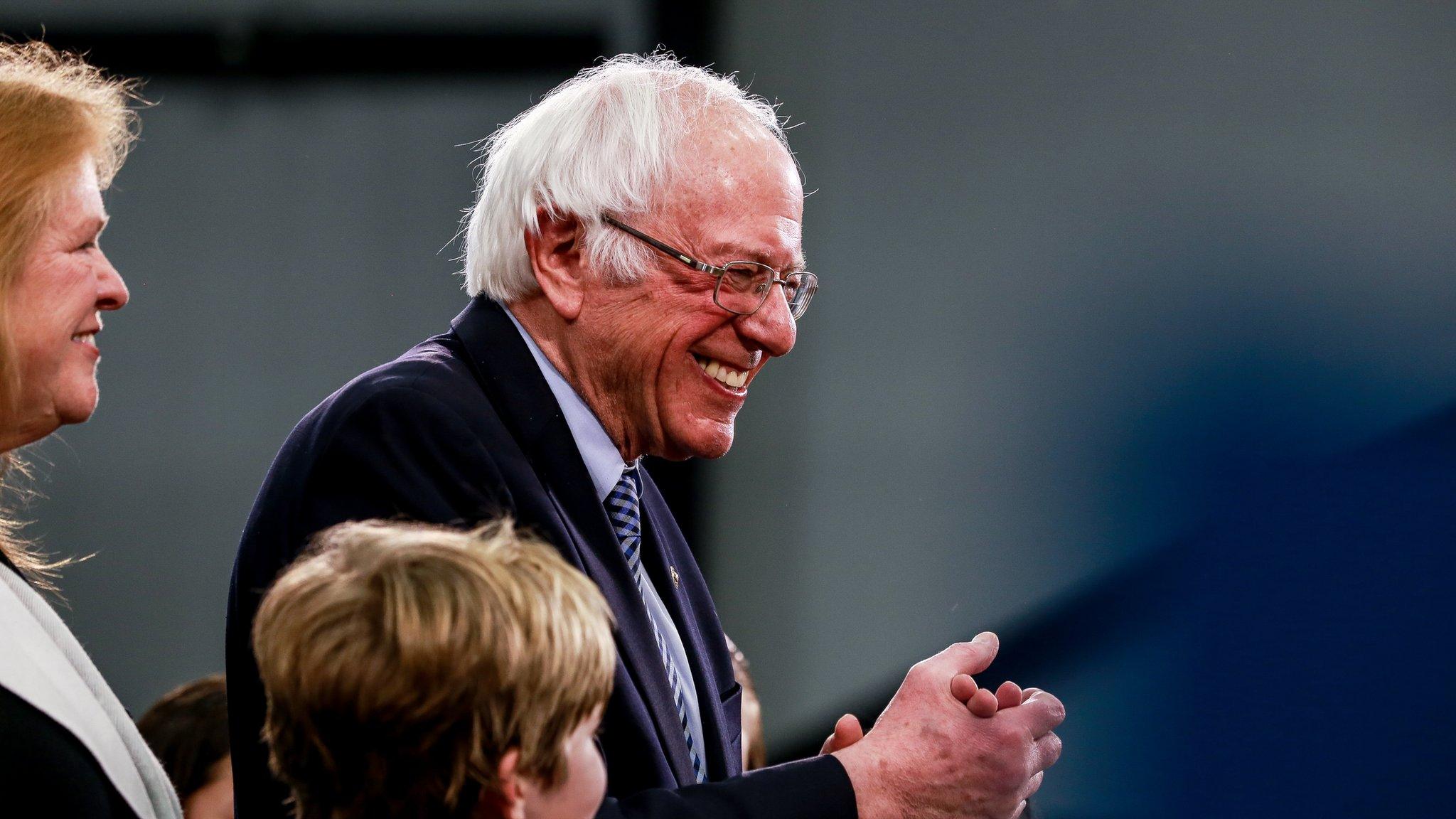The complicated truth behind Trump’s ‘American comeback'
- Published
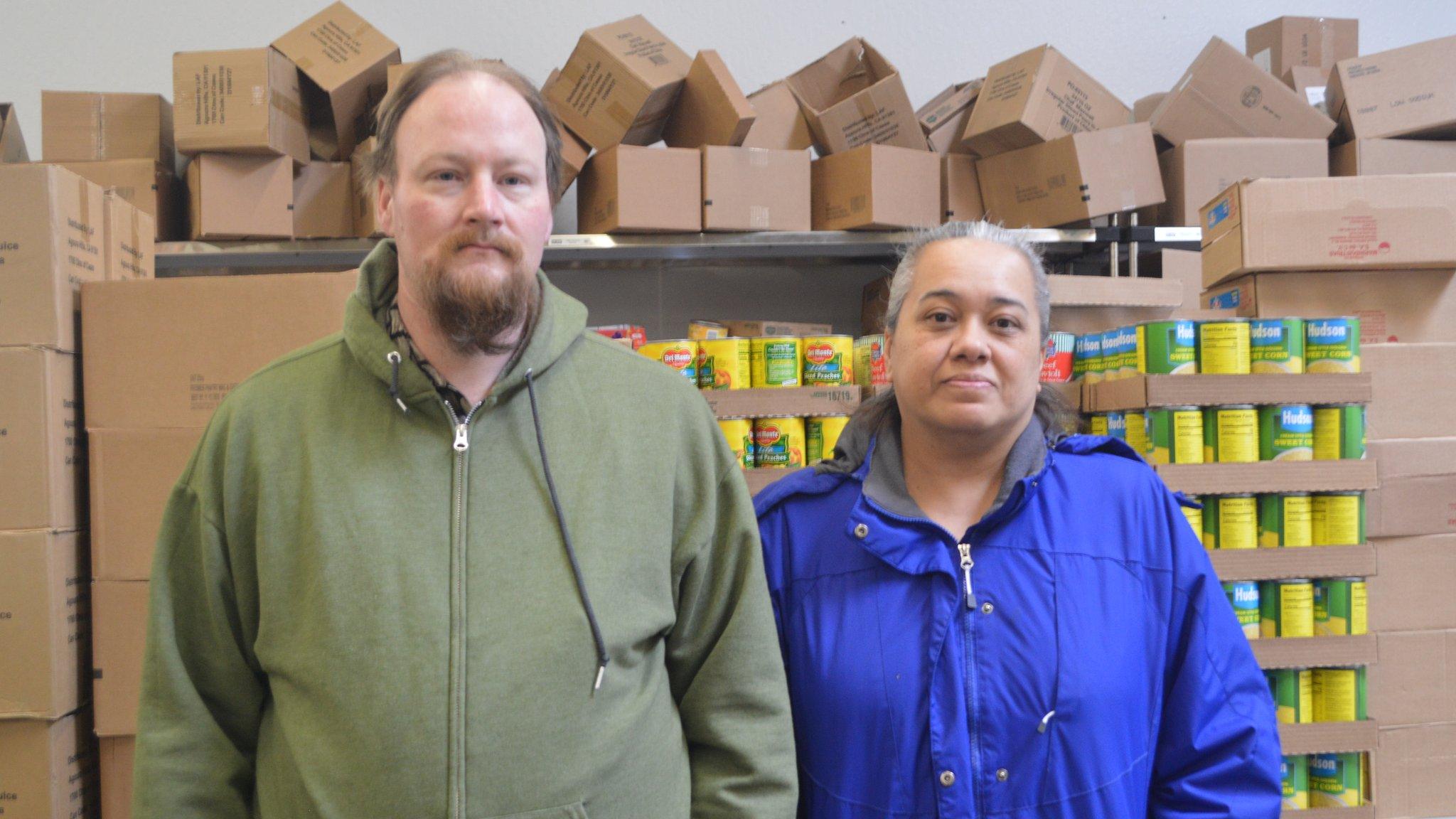
"We basically ended up living in our car"
Corin Kealoha and Shaun Karagory both work full time - but cannot afford food without the help of a food bank.
"We can't even live off our wages," says Corin, 46, who works as a hotel receptionist. "That's why we come here."
The couple are at St Vincent's Food Pantry, in Reno, Nevada, where they have picked up cardboard boxes containing cereals, bread, milk, peanut butter, and some meat.
And their story offers a glimpse into the complicated reality behind the economic recovery lauded by President Donald Trump.
In his January State of the Union, President Trump hailed the "great American comeback", stating: "Jobs are booming. Incomes are soaring. Poverty is plummeting… the years of economic decay are over."
It's a narrative he hopes will help him win November's presidential race - including in Nevada, a swing state that supported Hillary Clinton by a margin of just 2% in 2016.
The western state, home to Las Vegas, was one of the worst hit by the 2008 financial crisis. House prices dropped up to 60%, unemployment soared to 14%, and the state had the highest number of home foreclosures nationwide.
More than a decade on, Nevada's home values have recovered, the state came first for job growth, external in the US in 2018, and unemployment now hovers at a 20-year low of 3.8%.
But to get a sense of some of the limits of the recovery, you only have to take a walk in downtown Reno.
Down North Virginia Street, there are glittery high-rise hotels and casinos, river walkways, and tourists taking selfies at the iconic Reno Arch, which proudly welcomes visitors to "the biggest little city in the world".
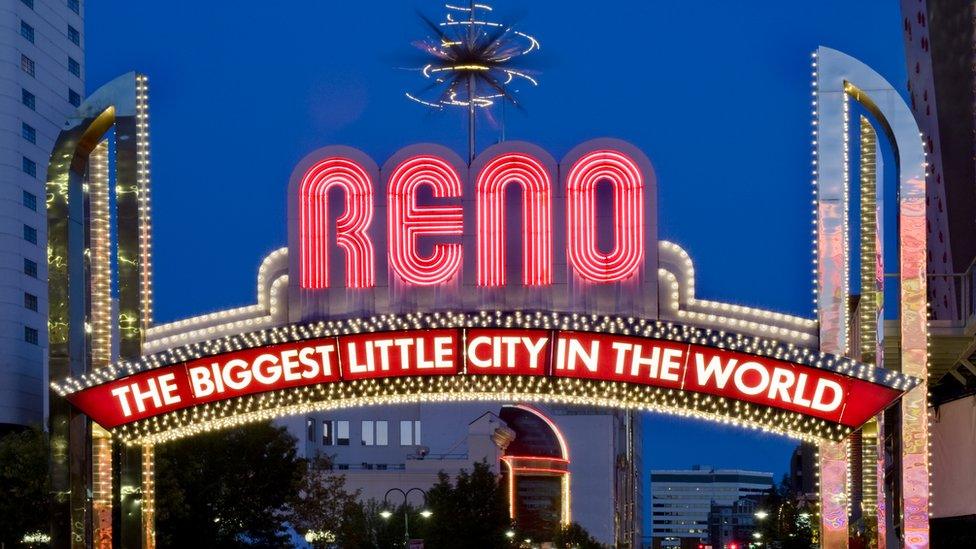
Yet if you take a different turn, and walk down East Fourth Street, the city looks very different. Instead of high-rises, there are smaller, weekly motels, and instead of tourists, you can see queues outside shelters and soup kitchens, and homeless people sitting, chatting, or doing push-ups near the railway tracks.
"Unemployment is low, but unfortunately unemployment is not a great indicator of how many people are hungry," says Jocelyn Lantrip, from the Food Bank of Northern Nevada, which supplies charities including St Vincent's Food Pantry.
And often, those going hungry - or temporarily homeless - are people who already have jobs.
"We have anything from 350 to 450 new families per month," says Carlos Carrillo, programme director at the St Vincent's Food Pantry, in between packing boxes with food.
"We used to have a lot of clients who were unemployed or on social security, but nowadays most of our clients are working families."
The food bank has even started offering dog and cat food to 1,500 families a month - a practical step after they realised that clients would often go hungry in order to feed their pets.
A majority of clients say they are forced to use the food bank because rents have soared.
"They take money out of their food budget to pay for rent, so that's where we come in, to provide a bit of the food that they're not buying anymore," Mr Carrillo says.
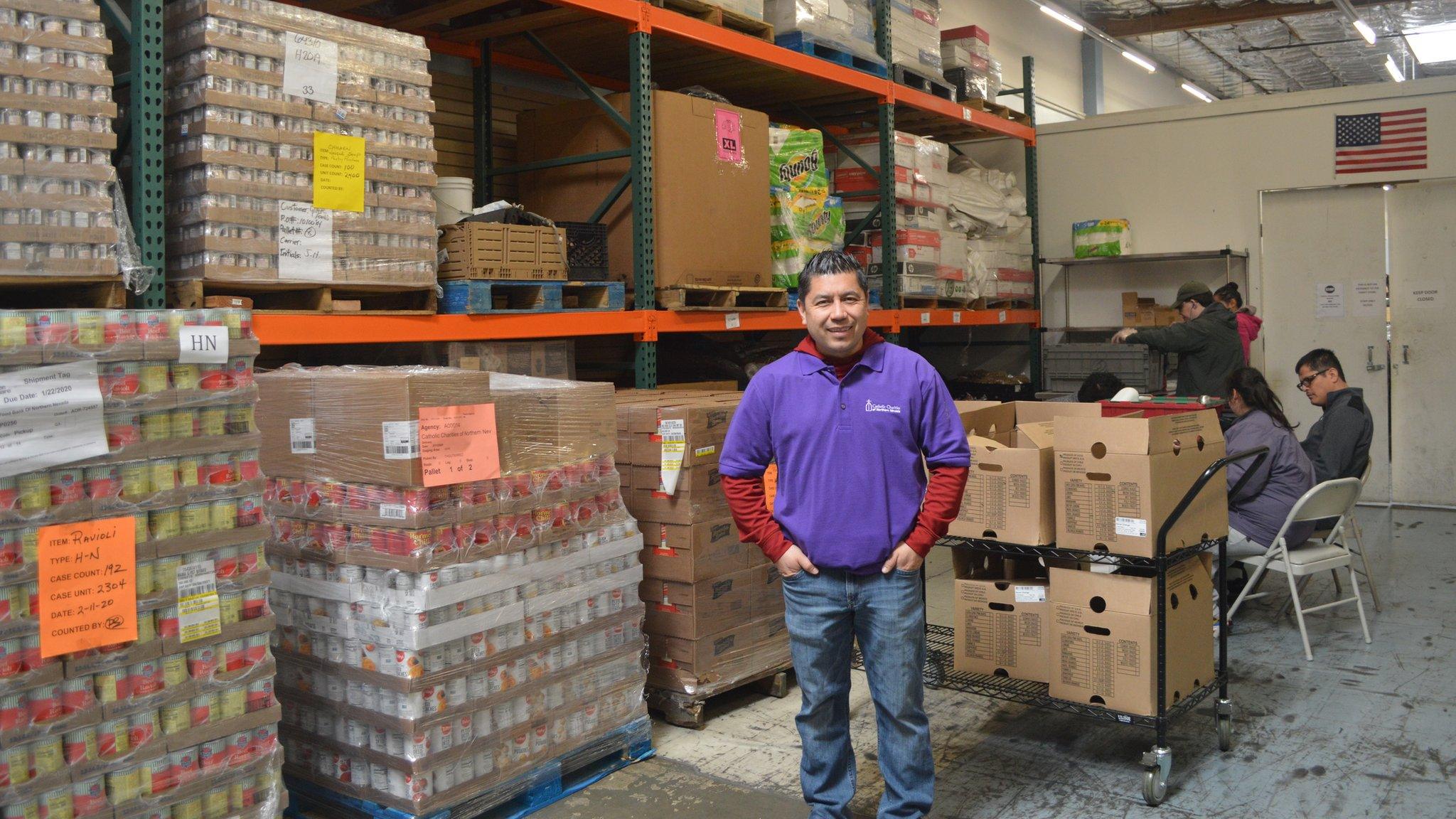
Carlos says St Vincent's Food Pantry serves about 300 families in Reno each day
Elliott Parker, chair of economics at the University of Nevada, Reno, argues that "recovery is in the eye of the beholder".
The latest data from the Census Bureau suggests that median household income is still just below 2008 levels, he adds.
"We are finally at the end of a very long recovery - but wages have risen nowhere near as fast as housing and rental prices."
Nevada has the nation's worst shortage of affordable housing for low-income families, according to an advocacy group, external, with only 19 homes for every 100 low-income renter households.
There are various reasons for the housing crisis - including stalled construction from the 2008 financial crisis that has been slow to pick up.
And Reno residents complain about the "Tesla effect" - as tech workers and retirees from the more expensive neighbouring state of California cross the border into Nevada, they push up rental prices for locals.
"Fifty percent of people in Nevada rent, and half of them are rent burdened - meaning they spend more than 30% of their income on housing," says state Senator Julia Ratti, whose district covers the Reno-Sparks area.
"This means they become very vulnerable to anything happening in their life - if you get a flat tyre, or your child needs medical care, you'll be late on your rent."
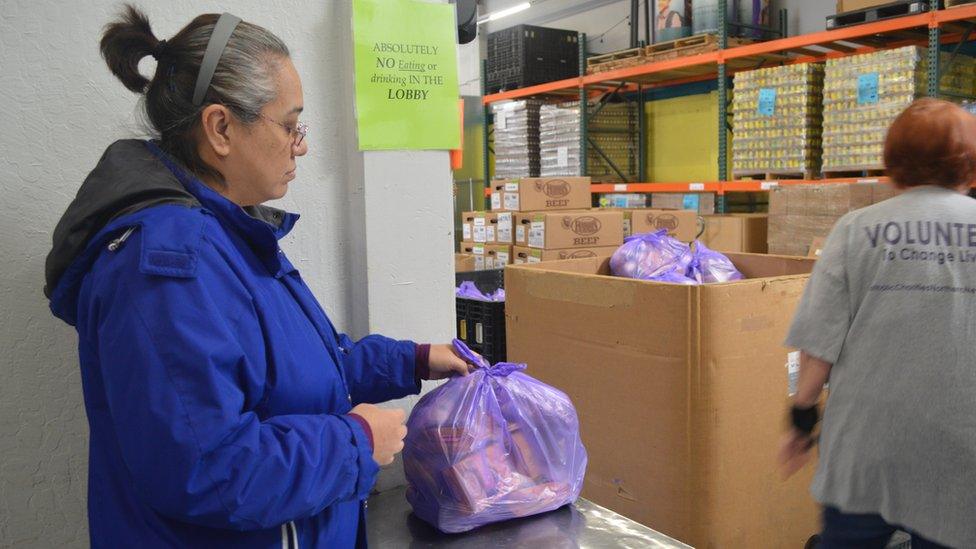
"Rent has jumped so dramatically you can't even stay on your two feet," says Corin
It's something Corin and Shaun, 39, experienced last year, after Shaun, who works as a security guard, developed fibromyalgia and had to take some time off work.
"We became homeless because I couldn't afford to pay the rent," says Corin. "We basically ended up living in our car."
They have since moved into a studio apartment - although the rent, which is $900 a month, takes a significant bite out of their wages - they both earn $10 per hour.
"We're not stable yet - we're not even sure what's going to happen," Corin says with a laugh. "We just live day by day for now."
John Restrepo, an analyst at RCG Economics in Las Vegas, says it is both true that the economy overall has grown - and that many working families are still suffering.
Those with equities in the stock market and small businesses have come out as winners from the economic recovery, he says, but wage earners have lost out.

Las Vegas is experiencing record unemployment
"About 60% of our households are not invested in the stock market - they depend on wages - and a large percentage of those folks, particularly lower-income workers, haven't benefited from the recovery at all," says Mr Restrepo. "The challenge is that wages have been pretty stagnant after you adjust for inflation."
He believes that many companies, "as a result of the great recession, decided to do business differently" - hiring more contractors and gig workers.
Nevada was also coming out of a particularly deep recession, which means "we've been growing for 10 years now, but it's also one of the slowest recoveries in terms of the rate of recovery."

The other issue that comes up again and again when you speak to Nevadans is the cost of healthcare.
Jim Eaglesmith spent four years caring for his mother, who had been diagnosed with chronic obstructive pulmonary disease, and eventually lost his job in a physical therapy clinic after he had to reduce his hours to look after her.
"The expenses of rent, home, healthcare, hospice and prescription needs meant I depleted my savings… in the last three years I used up her savings and my 401K. I spent everything I had thinking she was going to have some money left over, but I ended up having to spend almost all of it," he says.
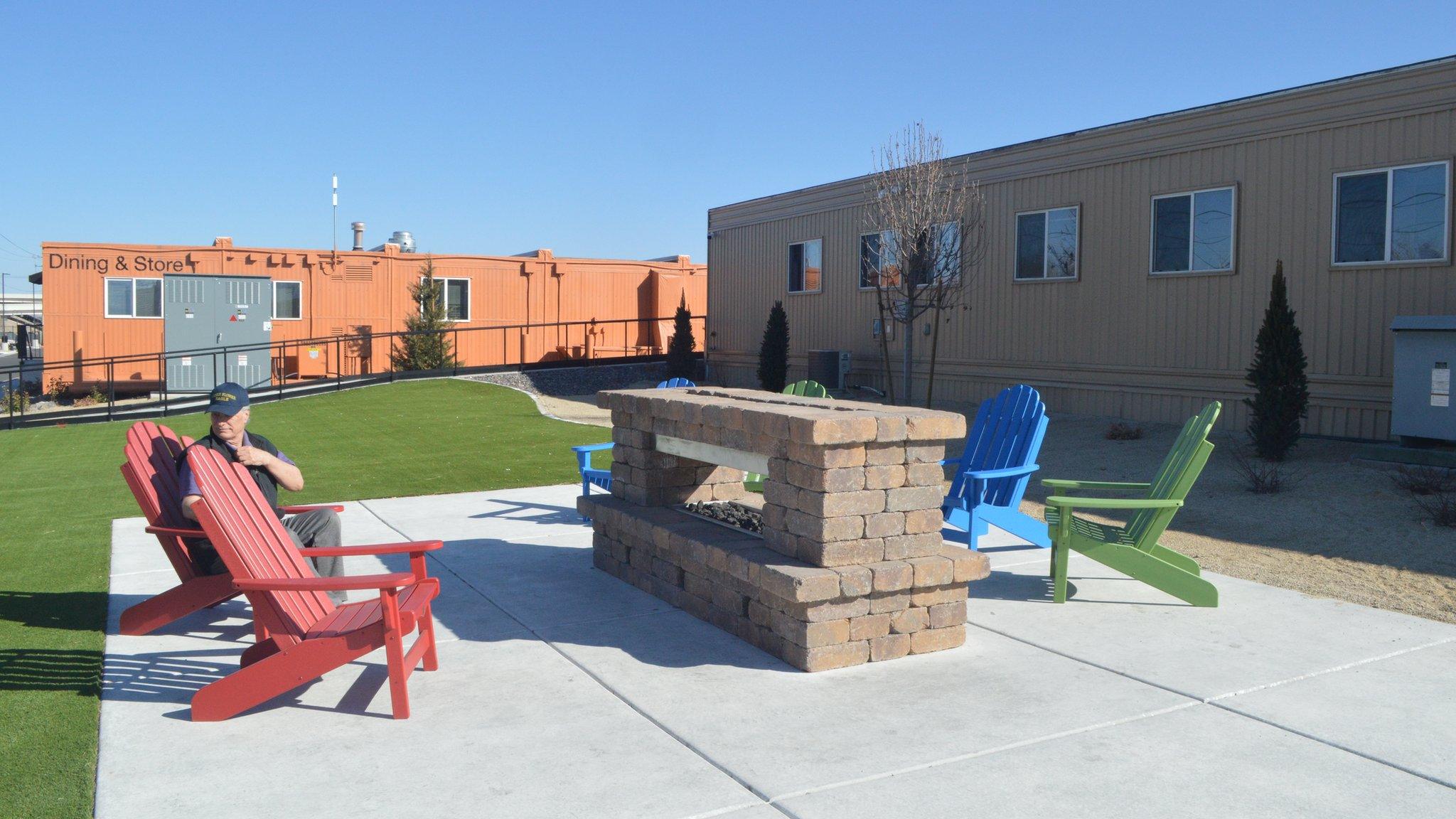
Jim lives at the Village on Sage Street, in a dormitory in a modular unit
After that, he says he was effectively homeless for two months, couch surfing with different friends until he was able to move into Village on Sage Street - a dormitory developed by the Community Foundation of Western Nevada - which is designed to help working poor individuals and offers single rooms for as little as $400 a month.
"I can't afford a lot of things, but I'm not here to make money," says Jim, who now works part time as a performance artist. "My value isn't based on my economic worth."
US healthcare costs are amongst the highest in the world, external - which means even middle-income families can feel vulnerable.
Adrielle Hammon, 35, works in a pre-school, making $9 an hour. Last year, she and her husband qualified for Medicaid, a public healthcare scheme for poor Americans - which meant when her son had a medical emergency, the $40,000 hospital bill was covered.
This year, her family's income has grown - Adrielle believes they are now "roughly middle class" - but it means they no longer qualify for Medicaid, and neither of them receives health insurance through work.
"We can afford food, gas and bills now," she says. "But you throw in things like hospital bills, and that's something worrisome... I don't go to the doctor for anything unless someone's literally dying."
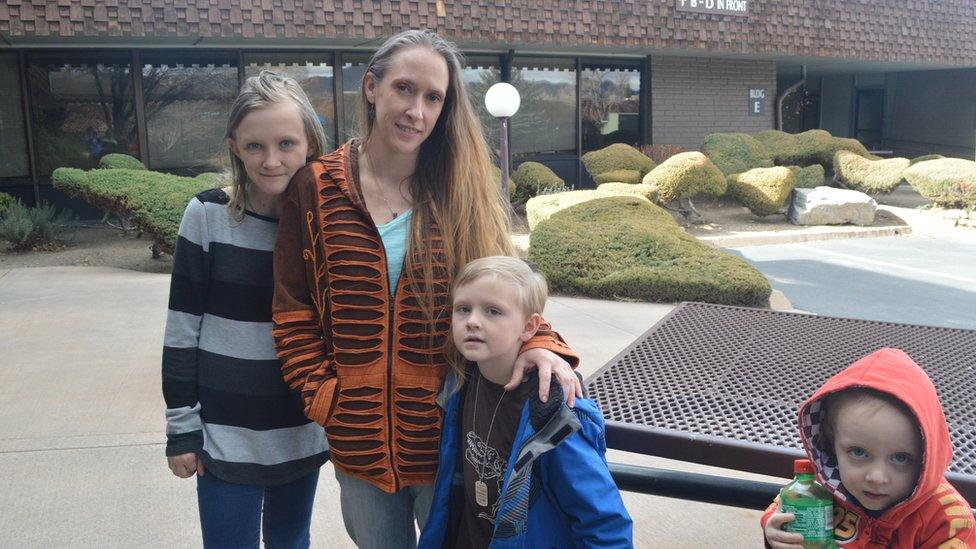
"I don't see it ever being the case that we can afford to buy a house" - Adrielle Hammon
And the American dream of owning their own home seems like a remote possibility, which she admits bothers her because "we always figured that by the time we were this age, we'd be able to afford to buy a house."
For many lower-income families, housing and healthcare costs can combine, to make them more vulnerable to unexpected emergencies.
Angel Mcceig-Escalanti, 44, says most of her family's income is spent on rent, and dealing with problems with their car.
"We've not been able to save any money at all - we have really been struggling," she says.
She lives with her husband, her mother, and one of her three children in a two-bedroom apartment costing $1,270 a month - "and one person doesn't have a bedroom - my mother sleeps on the couch."
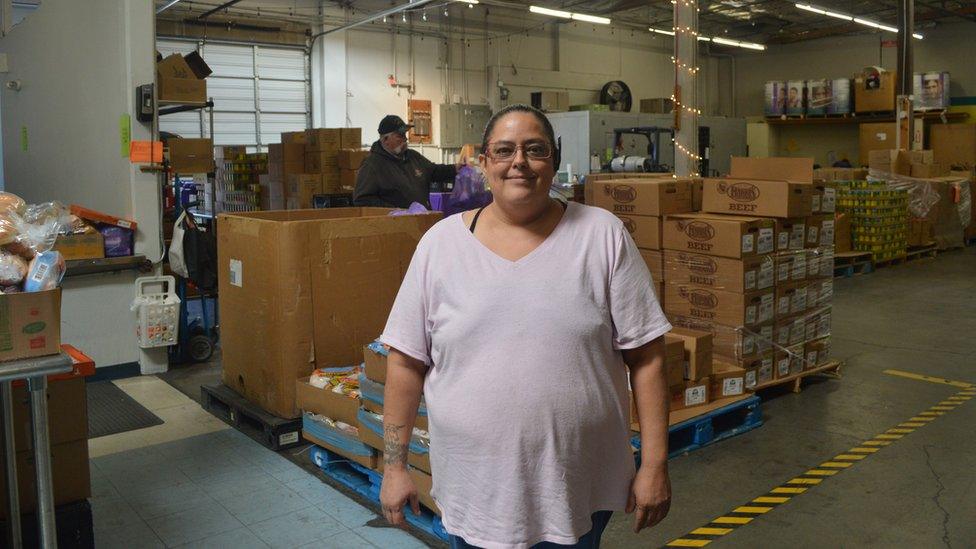
"I only use the system when I need it" - Angel Mcceig-Escalanti
She visits St Vincent's Food Pantry for fresh and canned fruit and vegetables, and visits several other food banks for help as well - particularly because, as a diabetic, she has to have a low-carbohydrate diet.
"We could buy food, just not the sort of food I should be eating. I'm supposed to be low carb, but that's the stuff that is the cheapest."
She also chooses the food carefully, hoping that this will help ensure her teenage son doesn't develop diabetes when he's older.

In politics, and in the media, it can be tempting to generalise - whether it is about the economic recovery, or the plight of lower-income families.
But the reality is often more nuanced - especially as the working class don't necessarily see themselves as poor.
I met Kayshoun Grajeda, 33, at the Culinary Academy of Las Vegas - a training centre that has built-in kitchens, a restaurant, and bedrooms for hospitality staff in training.
She's beaming with pride as she explains it's her last day on the guestroom attendant course, and as she demonstrates how to make a bed in five minutes while keeping the sheets perfectly smooth.
"If you really want something, and put your best foot forward, you can accomplish it," she adds. "There's help - you've just gotta want it. You can't put the blame on somebody else."
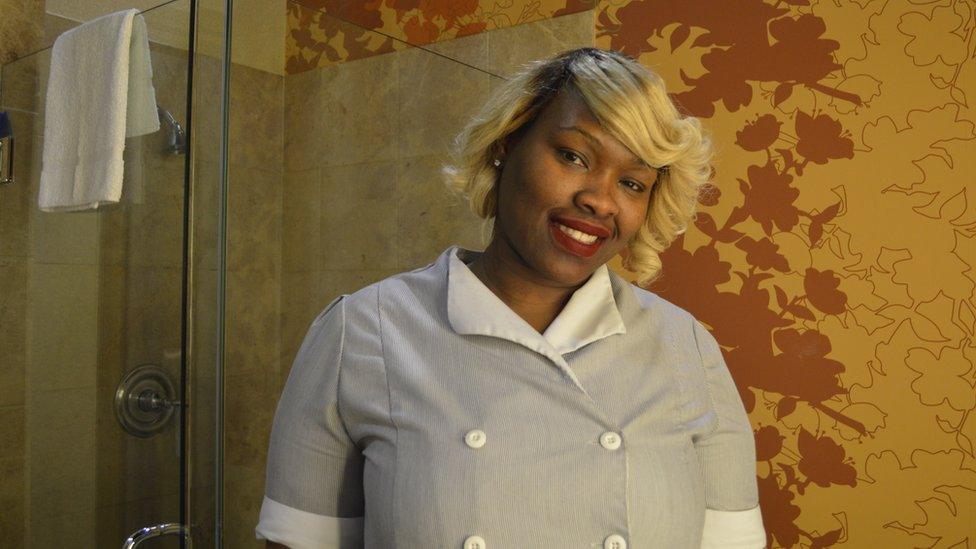
Kayshoun says her three children are extremely proud that she is about to graduate from the Culinary Academy
The single mother of three has just been offered a job with a hotel, and believes it will be a significant step up from her previous job as a hair dresser.
"I want things for my kids, so this is definitely a good start, you know? I'm starting at $15.35, but it's a start! It's above minimum wage," she says with a grin.
It's a sense of positivity that is partly shared by Deidre Hammon, who lives with her daughter Brianna in a mobile home in a trailer park on the outskirts of Reno.
Deidre (who is also Adrielle's mother) works three jobs - as a contractor at a law firm, as an advocate at a centre for children with disabilities, and as a carer for Brianna, 36, who lives with cerebral palsy.
"We're all very optimistic about our lives, we don't want to see ourselves as poor people who can't afford anything," she says.
But she adds that the difficulties that working families face are very real. Her car just broke down, so she's been forced to spend $250 per week on a rental car, since she needs to drive for work and to transport Brianna around.
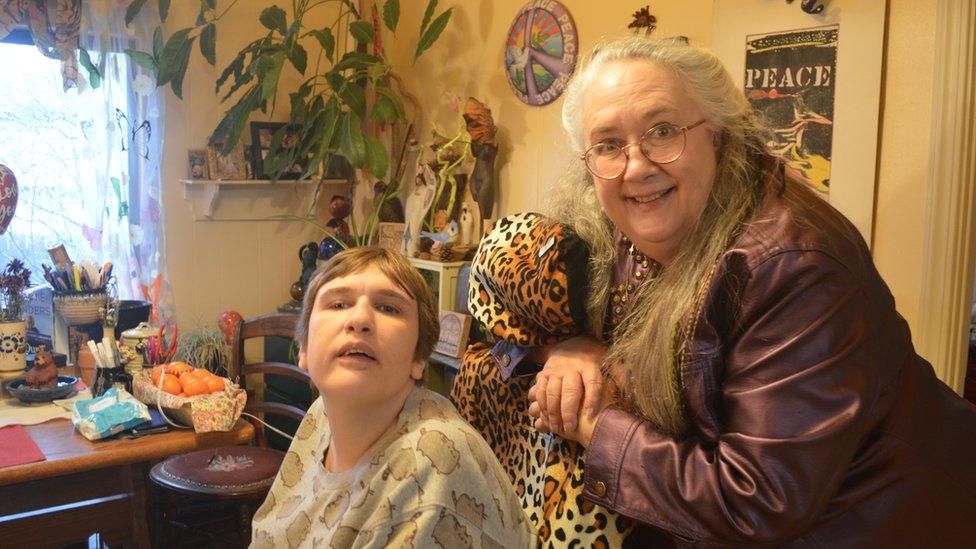
Brianna and Deidre Hammon
While she would rather work in a full-time role with benefits, "it's easier to have low-wage jobs I can quit easily, and then find another low-wage job" - because she sometimes needs time off at short notice to care for her daughter.
She also can't afford a wheelchair van - which means she has to manually help Brianna in and out of the car.
"I have to swing the wheelchair into the back of the car, break it down, put it together, and transfer Brianna into the car, two to three times a day. I have amazing upper body strength right now, but who knows how long that's going to last? I'm almost 60!"
She says she has to look after Brianna herself, because there aren't enough service providers in northern Nevada.
She meets other mothers caring for adult children with disabilities, and they all find the prospect of their children living without them "terrifying", she adds.
"We all feel like we can't die, ever - because who's going to take your place?"
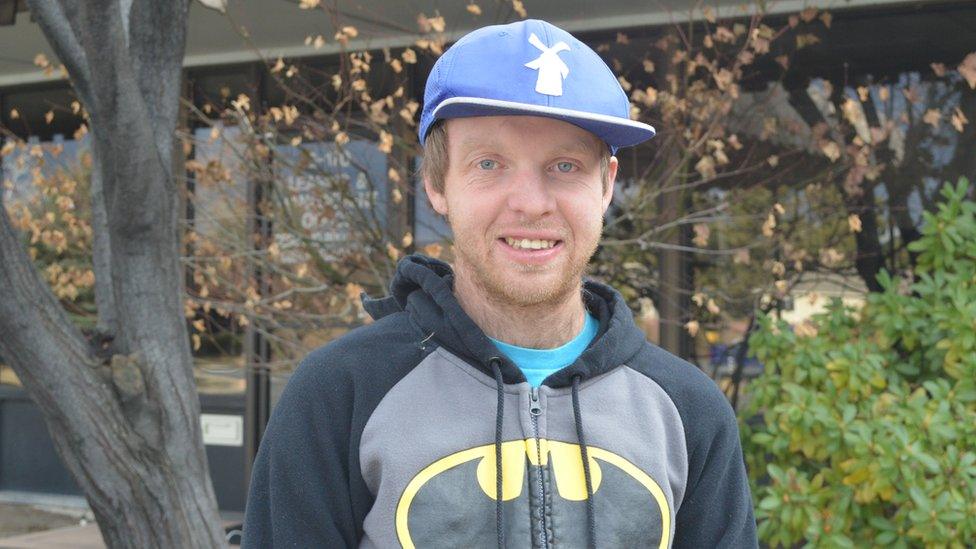
Chris says he plans to vote Republican: "I prefer to go by my standards - I'm pro-life"
Meanwhile, Christopher Ripke lives with epilepsy, and works full time as a dishwasher at the University of Nevada, Reno - sometimes working seven days a week, as he often offers to work overtime. He also leads People First, a non-profit that helps people with disabilities.
He makes $9.30 an hour - sometimes making $13.50 per hour for overtime - and also receives some rental assistance and food stamp assistance, but says he still falls below the poverty level.
Despite that, he feels pleased to have medical coverage in his job - and says he "absolutely" feels optimistic about his future. "I'm setting money aside for future plans - I plan to move to Texas because the healthcare's better."

Nevada is third in the Democratic primary race - and the state bills itself as more ethnically diverse, and more working class, than either Iowa or New Hampshire.
At Wednesday's Democratic debate in Las Vegas, Bernie Sanders, Elizabeth Warren, Pete Buttigieg and Amy Klobuchar all made specific appeals to working families, or talked about the need to raise wages.
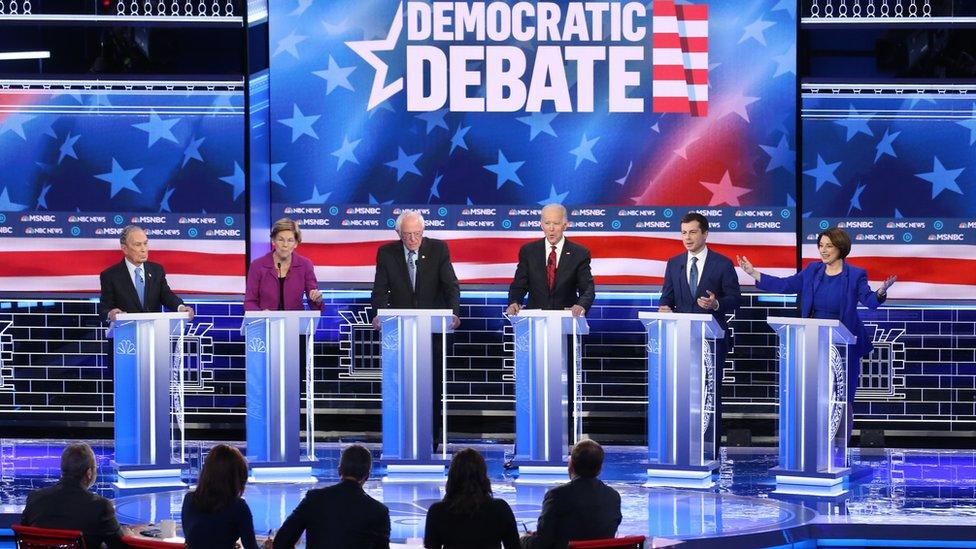
At Wednesday's Democratic debate, several candidates made overt appeals to the working class
But voting patterns can be personal - and unpredictable - and politicians take the working-class vote for granted at their peril.
Deidre, Brianna and Adrielle all support Bernie Sanders because of his Medicare for All proposals - and do not want to see President Trump win. Brianna says bluntly: "If Trump gets re-elected I'm probably dead. He plans to cut all the programmes that make my life possible."
Meanwhile, Christopher and Angel both support President Trump - Christopher because he disagrees with the Democratic candidates' stance on abortion, and Angel because "when he says something, he does it".
Christopher uses food stamps, and is not convinced by reports that Mr Trump's proposed budget would cut food stamps and the safety net. "That's one thing I don't believe - if I see it, I see it, but I've heard nothing about that."
Meanwhile, Angel believes Mr Trump's proposal to reduce the safety net is a good idea. "I've been working since I was 13, and… I only used the system when I needed it. People don't do that anymore, now they use it because there's free stuff."
And while Kayshoun's "best foot forward" attitude chimes in with how the Republicans say they help working families, she's actually unimpressed with both Mr Trump, and the Democratic candidates.
"We need a new president, and not the one we've got," she says, adding that she plans to vote independent this year "because I'm not really feeling nobody".
All pictures copyright
- Published3 November 2020

- Published8 October 2018
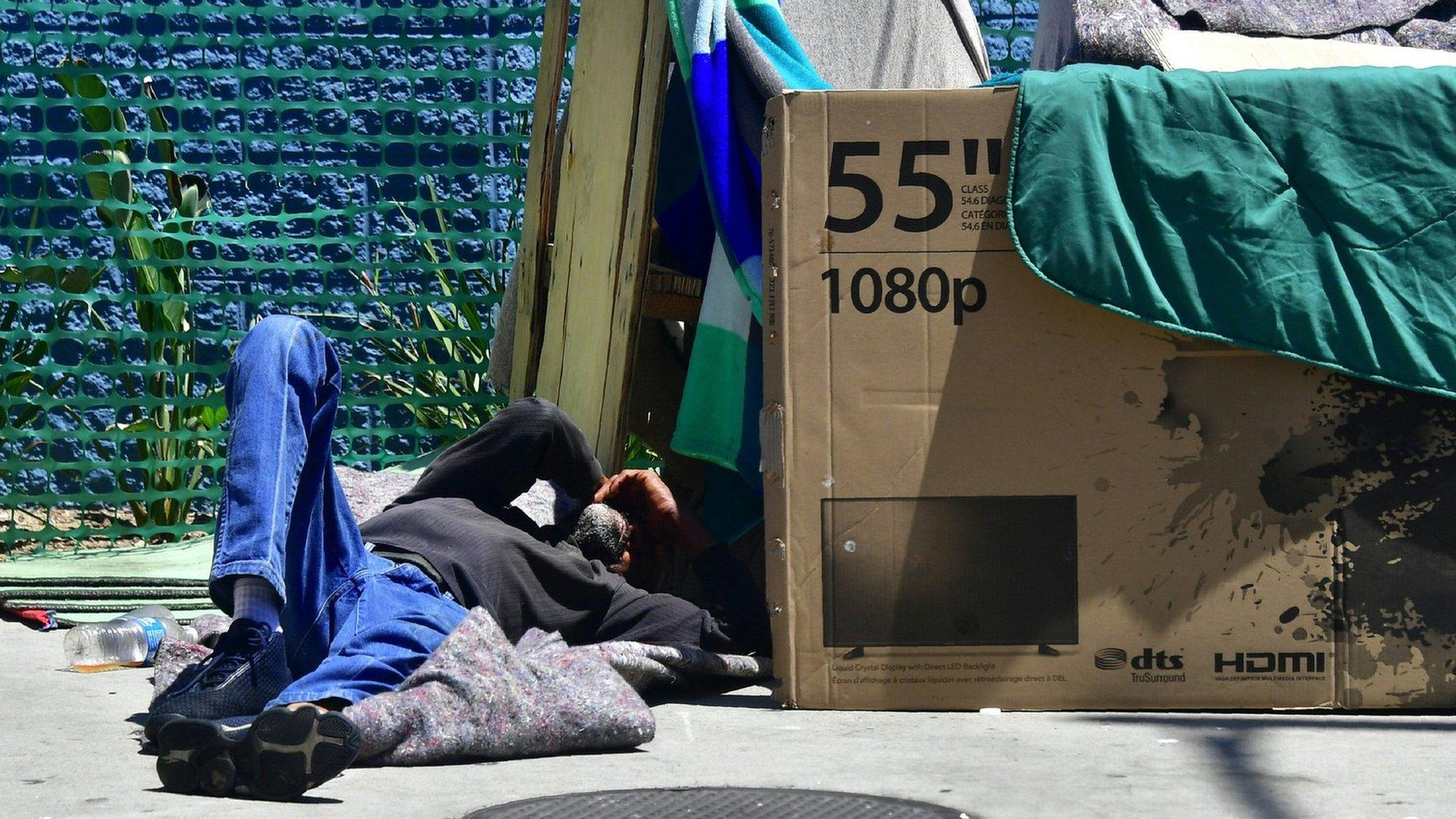
- Published16 February 2020
